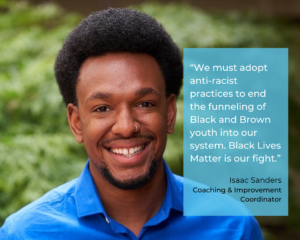Our Coaching and Improvement Coordinator Isaac explains why our sector cannot sit on the sidelines as our communities fight to end police violence. Please help us elevate community organizers’ demands in Seattle and send a message to Mayor Jenny Durkan calling for less policing and more community-based solutions,
I can’t start writing without acknowledging #GeorgeFloyd and the long list, spanning 400 years of American violence, of Black and Brown folks murdered by the state. The murder of Black and Brown folks by the state has been embedded in the history of the United States. As a Black person living in this country, I still struggle with finding ways to talk about this history and our current times like it’s not my own.
These murders are a reminder that this world does not see me as equal due to the color of my skin. I remember the words of James Baldwin, that “to be a Negro in this country and to be relatively conscious is to be in a rage almost all the time.” My mother and grandparents made sure to keep me conscious, and suspicious, of the state at a young age. Even as they held positions in systems they called corrupt, we survived on truth, transparency, and the knowledge that things could be better.
Black and Brown families, youth and adults, keep disproportionally falling through the cracks of public services due to racial discrimination and/or bias within these systems. This struggle of calling for our “systems of care” to care for everyone has been carried for centuries by Black and Brown revolutionaries, but it’s not just my problem, or Black and Brown people’s problem. It is a problem for our whole society to solve.
As an advocate for ending youth homelessness, I do not struggle to talk about how the system fails young people experiencing homelessness, every day. What I do struggle with is knowing that this system is directly connected to the state-sanctioned violence that allows police brutality to disproportionally impact Black and Brown people. The overrepresentation of Black and Brown folks being arrested, over-policed, and ultimately gaslit into submission at the hands of the folks who are tasked with “protecting and serving” communities can easily be connected to the overrepresentation of Black and Brown youth in the homeless system. Black and Brown communities are at no fault in this overrepresentation, though our cultural narratives would have us believe so.
 These narratives do not serve us in our work to end youth and young adult homelessness. As workers in this sector, we must adopt anti-racist practices to end the funneling of Black and Brown youth into our system. Black Lives Matter is our fight, as are the countless other movements demanding police accountability. Standing in solidarity with these protests is standing in solidarity with the 16-year-old Black young person who cannot access services due to biased federal mandates that rule our local shelters. It’s standing in solidarity with the 23 year old Latinx young person who lost all of their belongings in an encampment sweep.
These narratives do not serve us in our work to end youth and young adult homelessness. As workers in this sector, we must adopt anti-racist practices to end the funneling of Black and Brown youth into our system. Black Lives Matter is our fight, as are the countless other movements demanding police accountability. Standing in solidarity with these protests is standing in solidarity with the 16-year-old Black young person who cannot access services due to biased federal mandates that rule our local shelters. It’s standing in solidarity with the 23 year old Latinx young person who lost all of their belongings in an encampment sweep.
The fact that large groups of folks experiencing homelessness can be categorized as a gang and jailed is police brutality. Calling to end youth homelessness must require our systems to end police brutality. Here are a few things we can do as a system:
- Listen to Black, Indigenous, People of Color (BIPOC) young voices to inform your system FIRSTAt a demonstration I recently attended, the organizers gave a safe space for young people to use their voice for change. In our system, you need to allow feedback from young people to better inform your practice. Those young people need to represent the disproportional number of BIPOC in our system. If you are noticing that you are listening to mostly white voices, you need to start asking why. Wherever you are at in elevating young people’s voices, you need to add an anti-racist lens. The youth are the future, so do not prematurely bury them with their ancestors by not listening to them.
- Collaborate with the advocacy of BIPOC folks in your communityFind your local Black Lives Matter affiliate and learn from their practices. During this time, we have seen millions of links to bail out funds, mutual aid funds, and meal trains. These programs have existed since the Internet began, and they have been organized by grassroots community efforts. Partnering with these efforts rather than creating this intricate maze of care that young people continuously struggle to navigate centralizes support. Ending youth homelessness looks like talking to all folks trying to change the world, so get connected!
- Create advocacy agendas and demands requiring police brutality and encampment sweeps to end in your communitiesIn Seattle, our police force has over $400 million to “protect and serve.” Our local organizers demanded the City cut that budget in half and reallocate those funds into community-based solutions. Could you imagine what we could do if part of that money was used to end youth and young adult homelessness? Imagine how much money the whole entire state has allocated to policing while we know that policing homelessness is not working. We need to advocate for these types of changes so that we can stop state-sanctioned violence at the hands of “protect and serve.’
George Floyd’s daughter recently was recorded saying her daddy changed the world. I imagine that Martin Luther King Jr’s kids, Malcolm X’s kids, and many other revolutionaries’ children felt the same. But what about the folks that are not elevated in the news? What happens to their kids? Our work is to make sure that they do not end up in homelessness. That they do not get exited from any program into homelessness. That they feel safe and secure in a world that historically has not protected them due to their skin tone. We need to stand with justice, and not the system that calls itself justice currently. The kind that is demanding that things change for the better. For all of us.

Leave a Reply